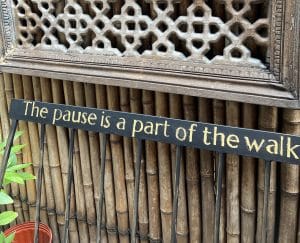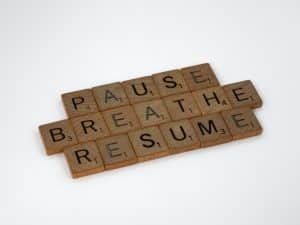
I’m guessing here, but chances are that you know yourself pretty well. Or, at least you think you do, to the extent that any of us can. You probably have a pretty clear idea of your preferences, tendencies, strengths, maybe even weaknesses, and how you typically engage with others in different situations. Now, we’ve talked before about “self-knowledge,” and how it can sometimes be limiting to our growth, in the sense that we may not push ourselves to do things that we aren’t good at because we “play to our strengths.” It’s just good sense, right? Except then nothing ever changes, including you. The same goes for those amazing times in life when we are starting a new chapter, and encountering the unfamiliar on the regular. When we have the chance to start fresh, do we really? Can we really?
I know you’ve heard that saying that “Old habits die hard.” You know it’s true when you’re trying to make changes to your diet or wellness routine, but – hate to break it to you – patterns are everywhere, my friend. Everything we think we know about ourselves prompts us to create routines in the way we encounter challenges, interact with others, and even in the way we think. It’s not surprising, actually, because how could you not learn from your experiences? You see a situation and you think, “I know how this goes, and I know how I am, and how you are, so here’s what I do.” You think it’s wisdom, maturity even, and to a certain extent it is, unless you’re not being mindful about it. Then, it’s just autopilot.
One of the most important side effects of a regular mindfulness practice is developing the ability to find “the space between stimulus and response” (V. Frankl), and to be intentional about the action we take as a result of a certain interaction. We often think about this as responding to people, which is one way it works. However, we also have reflexive responses to larger situations, especially those that make us uncomfortable. We’re really good at getting back into our comfort zones, sometimes before we even consciously realize we’ve left them.
Back to this point about new experiences. When you move (one of the great stressors of life, btw), start a new job, go back to school, or get into a new relationship, you’re in uncharted territory. So what’s your first response? To get comfortable. To find your places, your “people,” and all the markers of familiarity. For the record, you should know by now that I’m not judging; I’ve been there many times over and done it myself, many times. As JKZ reminds us, “Wherever you go, there you are.” You can’t escape yourself, and in many cases, that’s a relief. But what do you think might be possible if you took a quick second before you started building a carbon copy of your previous chapter in this new one?
Maybe that’s ultimately what you end up doing. Perhaps some semblance of the familiar is going to be important for grounding you while other things get tossed up in the air. That’s ok. But maybe you’re up for something a little different this time around, and you decide to open yourself up to the possibility that what has served you before won’t be necessary now. The point is to see the pattern, and choose whether to continue it.
There’s also this startling possibility: your old familiar routine doesn’t work in a new context. You’re looking for all the usual suspects, and they’re just not there. Ruh-roh. Looks like the universe might be making the choice for you – sort of. What do you do in this case? Do you back away? Crumble? Shut down? Or do you breathe, and see what happens when you open yourself up to new possibilities? Remember, it’s wherever you go, there you are – not wherever you were.
Change can be exciting, and also full-on scary. Stepping into the unknown can lead us to grasp for anchors wherever we can find them, which is usually in all the places we’ve found them before. Sometimes, that’s just what we need, if the change is so big that jumping in headfirst is too much at once. Other times, it might be exactly the habit that keeps us from growing into what’s next.
How do you tell the difference? How do you know when it’s time to root down, or time to push out?
You notice, you breathe, and you check in with yourself. You make your choices mindfully, courageously, but also compassionately. You be there for you. And if you miss it this time, don’t even worry. Change will be back, constantly.
Photo credit: Alex Blăjan




5 thoughts on “Anchors away”
Pingback: No-Fail Friday: Rinse or repeat | MindfulMBA
Pingback: On a loop | MindfulMBA
Pingback: Exactly right | MindfulMBA
Pingback: Groundwork | MindfulMBA
Pingback: Life-changing | MindfulMBA